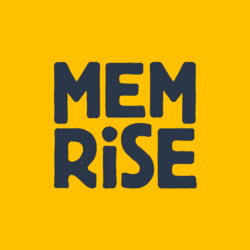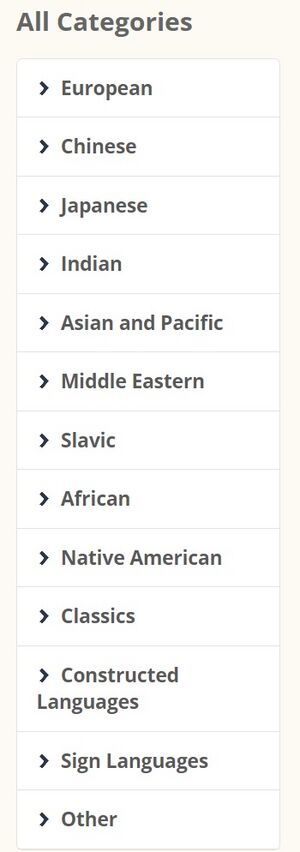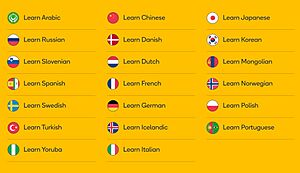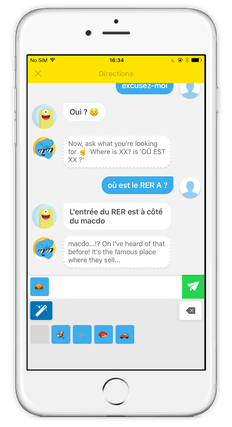Memrise facts for kids
 |
|
|
Type of site
|
Privately held company |
|---|---|
| Available in | Arabic, Chinese, Danish, Dutch, English, French, German, Indonesian, Italian, Japanese, Korean, Norwegian, Polish, Portuguese, Russian, Spanish, Swedish, Turkish, Ukrainian, and Vietnamese |
| Founded | 2010 |
| Area served | Worldwide |
| Founder(s) | Greg Detre Ed Cooke Ben Whately |
| CEO | Steve Toy |
| Website | memrise.com (community courses) |
| Registration | Yes |
| Launched | September 2010 |
| Current status | Active |
Memrise is a British online platform that helps people learn new languages. It uses a special method called spaced repetition with flashcards. This method helps you remember things faster. Memrise is based in London, UK.
Besides languages, Memrise also has content created by its users on many other topics. The Memrise app offers courses in 16 languages. Its website has even more languages, including less common and ancient ones. By 2018, 35 million people had signed up to use the app. Memrise has been financially successful since late 2016.
Contents
Memrise: A Quick Look at Its History
Memrise was started by three people: Ed Cooke, Ben Whately, and Greg Detre. Ed Cooke is a Grand Master of Memory, meaning he's really good at remembering things. Greg Detre is a scientist who studies how our memory works.
The website first launched in a private test version. This happened after it won a competition at Princeton University in 2009. In July 2010, Memrise won another award at the London Mini-Seedcamp competition. It was also a finalist for the TechCrunch Europas Start-up of the Year in November 2010. In May 2017, Memrise won the "Best App" award at the Google Play awards.
On October 1, 2012, a non-test version of the website, called Memrise 1.0, became available. By May 2013, you could download the Memrise app on both the Apple App Store and Google Play. The company has received investments to help it grow over the years.
How Memrise Helps You Learn
Memrise uses several cool features to make learning fun and effective. It's designed to feel like a game, similar to other learning apps like Duolingo.
Spaced Repetition: Learning Smarter
Memrise uses a technique called spaced repetition to help you learn languages faster. Imagine you learn a new word. Instead of reviewing it every day, spaced repetition shows you the word again after increasing periods of time. For example, you might see it tomorrow, then in three days, then a week, and so on. This method helps your brain remember information better over the long term. It's a proven way to improve memorization.
Community Courses: Learn Anything
People who use Memrise can create their own "courses." These courses are lists of words and phrases. They can include audio and pictures to help you learn. You can use these courses for yourself or share them with everyone. This feature has led to many different "community courses." They are great for learning languages that are not very common. This includes languages with few learning materials.
By 2012, Memrise already had courses for about 100 languages. These ranged from Catalan to Haitian Creole. Users have even created courses for made-up languages like Klingon and Esperanto. You can also find courses for old languages like Latin and Ancient Greek.
In Taiwan, the government has used Memrise to teach local languages. These include Amis and Taiwanese Hakka. People trying to save endangered languages also use Memrise. For example, the Ume Sámi language, spoken by very few people, has a course. In the United States, Native American nations use Memrise to teach their heritage languages. These include Cherokee and Navajo.
Experts have praised Memrise for helping with language revitalization. They say it's flexible, easy to use, and fun. It also helps fluent elders and young people work together.
Besides languages, the community has made courses for other subjects. These include geography, history, and science. Some are for general interest, and some help with test preparation.
In July 2024, Memrise announced a change. Community courses would move to a separate platform. They would no longer be part of the main app experience.
"Mems": Memory Helpers


Memrise used to have a feature called "mems." These were memory aids created by users. They helped learners remember new information better. Mems were often funny or silly to make them easy to recall. For example, a picture of Abraham Lincoln might help you remember a German word.
In 2012, one of the founders, Ed Cooke, said that more users meant more new mems. This created a strong learning community. However, since September 2022, mems have been removed from the site. Many users were unhappy about this change.
Official Courses: Structured Learning
As of February 2025, Memrise offers official learning materials for 35 languages for English speakers. They also have materials for speakers of many other languages, like Arabic, Chinese, and Spanish.
Since 2023, the official courses include an "AI Language partner." This partner uses advanced technology to let learners practice conversations. Memrise believes this helps learners feel more confident when speaking a new language. These official courses do not cover as many languages as the community courses. They also do not offer non-language subjects.
Gamification: Making Learning a Game
Memrise uses game-like elements to keep you motivated. For example, it has a leaderboard that shows who is learning the most. In late 2012, the leaderboard was paused for a short time. This was because some users were cheating to get high scores. Memrise then fixed the problem and brought the leaderboard back.
Changes to Community Content Support
Memrise started as a platform where users created a lot of the content. Over time, the company has focused more on its own official courses. This has led to some changes for user-created content.
Separating Community Courses in 2019
In early 2019, Memrise announced that user-created content would move to a different website. This new site, called "Decks," would not have an app. Users would also not be able to learn offline. Many users were very upset about this. So, in February 2020, Memrise decided to bring the content back to the main site.
Another Separation in 2024
However, in November 2023, Memrise announced new plans for user-created courses. They planned to "sunset" them, meaning they would slowly remove support. The official forum for users was even closed in December 2023. This showed the company's shift away from community content.
In February 2024, Memrise again moved community courses to a new website. This new site is not available through the updated mobile app. This means users cannot download these courses to learn offline anymore. Memrise stated that these courses would remain on the new website until at least the end of 2024. The CEO has tried to explain these changes to users. Many users have expressed frustration and worry about the future of community courses. As of March 2025, community courses are still available on the website.
See also
 In Spanish: Memrise para niños
In Spanish: Memrise para niños
- Anki
- Computer-assisted language learning
- Language education
- List of flashcard software
- List of language self-study programs
- Rosetta Stone
 | Charles R. Drew |
 | Benjamin Banneker |
 | Jane C. Wright |
 | Roger Arliner Young |




